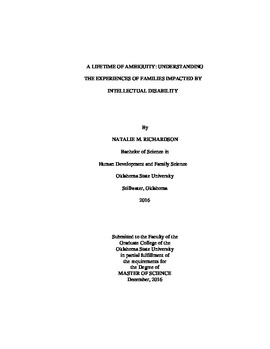| dc.contributor.advisor | Gallus, Kami L. | |
| dc.contributor.author | Richardson, Nataile M. | |
| dc.date.accessioned | 2018-06-29T14:41:09Z | |
| dc.date.available | 2018-06-29T14:41:09Z | |
| dc.date.issued | 2016-12-01 | |
| dc.identifier.uri | https://hdl.handle.net/11244/300373 | |
| dc.description.abstract | Families are a valuable resource for individuals with intellectual disability (ID). However, the experiences of such family members are often overlooked. The services and supports that states provide are typically designed exclusively for the individual with ID, leaving family members with limited support of their own. Family members of individuals with ID are often called upon to provide support for their children and siblings well into their loved ones' adult years. Therefore, it is important to better understand the lifespan risks of families of individuals with ID in order to move toward a transferrable model of family supports for today’s families facing their own unique societal and policy changes. Using grounded theory methodology, the current study explored the experiences across the lifespan of parents and siblings of adults with ID. This unique sample of 23 family members experienced not only the institutionalization of their loved ones but also, years later, state-mandated deinstitutionalization. An in-depth analysis process revealed five common categories of intra and interpersonal processes shared among family members across the lifespan that took place during difficult transition periods: (a) ambiguous loss, (b) ambiguous roles, (c) ambiguous futures, (d) ambiguous emotions, and (e) ambiguous coping. A theoretical model was developed to represent the ongoing interrelatedness between the experiences of family members of individuals with ID over time. The central category of ambiguity connects the major categories and subcategories and suggests families are often faced with numerous stressors simultaneously and often for extended periods of time. The ambiguous experiences provide evidence of the unique circumstances and potential challenges professionals and clinicians should consider when providing services and supports to family members of individuals with ID. Implications for the unique role clinicians can play when working with such families are discussed, including a reference for exploring the unclear experiences for each member of the family system during various transition periods. | |
| dc.format | application/pdf | |
| dc.language | en_US | |
| dc.rights | Copyright is held by the author who has granted the Oklahoma State University Library the non-exclusive right to share this material in its institutional repository. Contact Digital Library Services at lib-dls@okstate.edu or 405-744-9161 for the permission policy on the use, reproduction or distribution of this material. | |
| dc.title | Lifetime of Ambiguity: Understanding the Experiences of Families Impacted by Intellectual Disability | |
| dc.contributor.committeeMember | Jones, Jennifer L. | |
| dc.contributor.committeeMember | Bishop, Alex | |
| osu.filename | Richardson_okstate_0664M_14889.pdf | |
| osu.accesstype | Open Access | |
| dc.description.department | Human Development & Family Science | |
| dc.type.genre | Thesis | |
| dc.type.material | text | |
